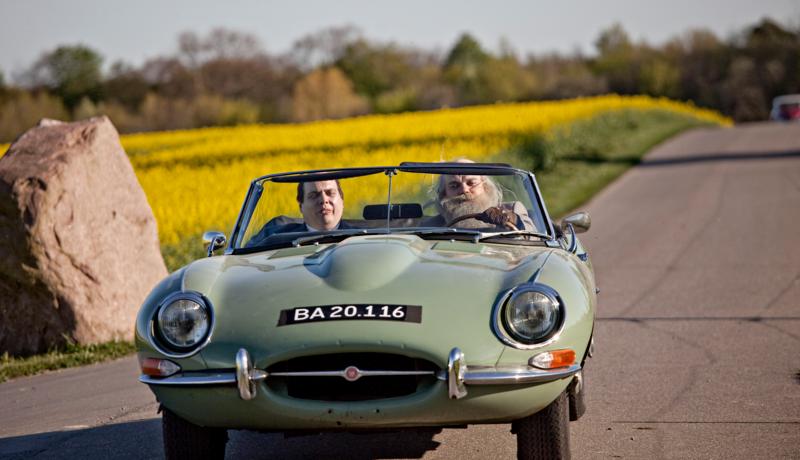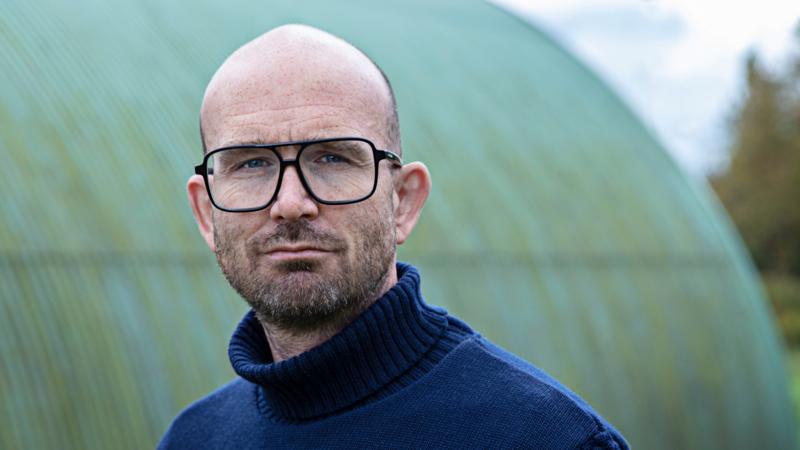By Katrine Hornstrup Yde
In Denmark, Christoffer Boe's sixth feature is known as "Spies & Glistrup". Every Dane over the age of 30 will recognize those names as belonging to two of the most eccentric power mongers in the nation's history.
Simon Spies revolutionised the travel industry in the '70s and '80s, hawking cheap package tours off his press savvy and bawdy playboy ways, feeding the public titbits about his "morning banging broads," crazy acid trips and the beloved walking stick, for which he would purchase separate seats in cinemas and on airlines. A lawyer, Mogens Glistrup shocked the Danish tax system by exploiting a legal loophole to avoid paying taxes. He later founded a rightwing party under the banner of zero taxation and, eventually, anti-immigration.
"The consensus when I was growing up was that Glistrup was the blackest sheep Denmark had ever known," the director says. "He was someone everyone could laugh at and who maybe once knew how to do a thing or two but was basically unlikeable and outrageously wicked. Spies, on the other hand, with his charm, turned everything that would normally be wildly unpopular into a winning hand for himself. He left a massive imprint on the Danish membrane. How did he dare do all the things no one else was allowed to do in Denmark?"
"Now that I've looked at them again as an adult, they represent something that I find incredibly likeable: they were entrepreneurial, vigorous personalities with a zest for life, for money, for sex. That's appealing, but of course there's a flipside. And the film doesn't try to hide it. When you're that involved in your own project, a lot of other people are going to pay the price."
Capitalist Rebels
That Spies and Glistrup were close friends from 1965 to 1973 is not a very well known story. Boe himself only learned about their close partnership during his years of research and writing with co-writer Simon Pasternak. Finally, the film grew into a story of friendship between the two oddballs and their chase after freedom with equal parts "Sex, Drugs & Taxation" – as the international title has it.
Boe shot parts of the film in old Copenhagen bars. He uses old 8mm footage of women in the streets in the sixties and, always aesthetic to a fault, he updates the Danish designer furniture in Spies' offices as the years pass. But the film is not about wallowing in nostalgia, Boe says. "I'm not dreaming about returning to the '60s – or the '70s or the '80s or the '90s. I don't think it was groovier back then," he says.
But the film can, Boe says, be seen as an alternative take on what was good about the '60s and the following decades:
"Hippie open-mindedness as a cultural type is found here in two capitalists. That way, the film offers a different image of the era. The open-mindedness we usually associate with young people listening to rock music is, in the case of Spies and Glistrup, the province of two middle-aged, balding, fat men who want to make a buck. Capitalism today has become a huge authority in our social thinking, with no real alternative. But for me, growing up in the '70s and '80s, capitalism represented a rebellious answer to freedom."
The film's two protagonists may not be crafting a whole ideological work, but they are chasing the fragments of one, Boe contends. "Their approach was sometimes intuitive, sometimes theoretical and sometimes it's just about the pleasure. Glistrup nor Spies didn't want anyone telling them what to do with their money, where to go, or what to eat. And in Glistrup's case, he knew a hell of a lot about income taxes."
Photo: Alphaville Pictures Copenhagen
The Perpetual Drive
Simon Spies is played by Pilou Asbæk ("Borgen", "A Hijacking"), while Glistrup is interpreted by Boe's regular leading man, Nicolas Bro, who nailed the demanding leads in Boe's "Beast" (2011) and "Offscreen" (2006).
"Bro is perfect for the part of Glistrup. As a person, Glistrup was a loveable human being, but it didn't take much before he was obsessed with something and controlled by a crystal-clear will. I love pursuing that idea in my stories, and I have made an incredible number of films where Bro embodies just that. In 'Sex, Drugs & Taxation', he has to combine humanity and obsession in a historically accurate person." Indeed, obsession is a principle the film wants to render. Sure, Glistrup today is remembered mainly for his last years as an anti-immigrant politician who was convicted and jailed under the racism law. But Boe sees something more inspiring going on with Glistrup in the period in which the film is set.
"There's a fundamentally anti-authoritarian and anarchistic ideology in Glistrup's thinking. The moment you tear down an authority, you set yourself up as one. It's a perpetual motion machine. At one point, Spies is thinking: When the hell are you going to shut up, so we can have a meatball and chase some young broads? But for Glistrup it's never ending. I'm basically fascinated by people who have this nonstop drive to go on. We would like someone's goal to be one where we can say: Okay, we're there. But life isn't like that. The moment we get there, we're dead."
"Sex, Drugs and Taxation" is produced by Tine Grew Pfeiffer and Caroline Schlüter Bingestam for Alphaville Pictures Copenhagen. International premiere at the Toronto International Film Festival.
Trailer



